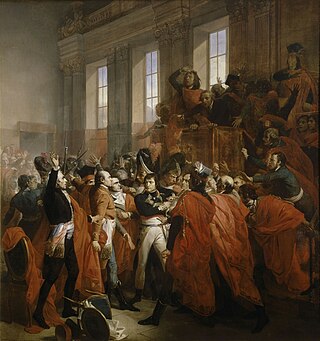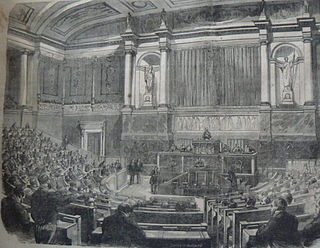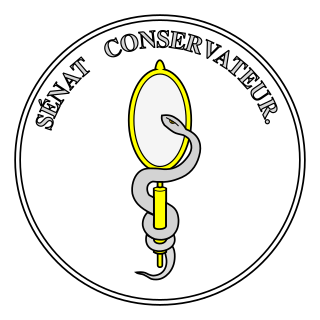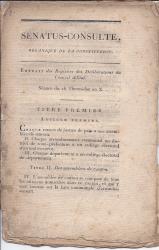
The French Republican calendar, also commonly called the French Revolutionary calendar, was a calendar created and implemented during the French Revolution, and used by the French government for about 12 years from late 1793 to 1805, and for 18 days by the Paris Commune in 1871, and meant to replace the Gregorian calendar.

1802 (MDCCCII) was a common year starting on Friday of the Gregorian calendar and a common year starting on Wednesday of the Julian calendar, the 1802nd year of the Common Era (CE) and Anno Domini (AD) designations, the 802nd year of the 2nd millennium, the 2nd year of the 19th century, and the 3rd year of the 1800s decade. As of the start of 1802, the Gregorian calendar was 12 days ahead of the Julian calendar, which remained in localized use until 1923.

Napoleon Bonaparte, later known by his regnal name Napoleon I, was a French emperor and military commander who rose to prominence during the French Revolution and led successful campaigns during the Revolutionary Wars. He was the leader of the French Republic as First Consul from 1799 to 1804, then of the French Empire as Emperor of the French from 1804 until 1814, and briefly again in 1815. His political and cultural legacy endures as a celebrated and controversial leader. He initiated many enduring reforms, but has been criticized for his authoritarian rule. He is considered one of the greatest military commanders in history and his wars and campaigns are still studied at military schools worldwide. However, historians still debate whether he was responsible for the Napoleonic Wars in which between three and six million people died.

The Concordat of 1801 was an agreement between Napoleon Bonaparte and Pope Pius VII, signed on 15 July 1801 in Paris. It remained in effect until 1905, except in Alsace-Lorraine, where it remains in force. It sought national reconciliation between revolutionaries and Catholics and solidified the Roman Catholic Church as the majority church of France, with most of its civil status restored. This resolved the hostility of devout French Catholics against the revolutionary state. It did not restore the vast Church lands and endowments that had been seized during the Revolution and sold off. Catholic clergy returned from exile, or from hiding, and resumed their traditional positions in their traditional churches. Very few parishes continued to employ the priests who had accepted the Civil Constitution of the Clergy of the revolutionary regime. While the Concordat restored much power to the papacy, the balance of church-state relations tilted firmly in Napoleon's favour. He selected the bishops and supervised church finances.

The Consulate was the top-level government of France from the fall of the Directory in the coup of 18 Brumaire on 10 November 1799 until the start of the Napoleonic Empire on 18 May 1804. By extension, the term The Consulate also refers to this period of French history.

The Cisalpine Republic was a sister republic of France in Northern Italy that existed from 1797 to 1799, with a second version until 1802.
This glossary of the French Revolution generally does not explicate names of individual people or their political associations; those can be found in List of people associated with the French Revolution.

The coup d'état of 18 Brumaire brought Napoleon Bonaparte to power as First Consul of France. In the view of most historians, it ended the French Revolution and led to the coronation of Napoleon as emperor. This bloodless coup d'état overthrew the Directory, replacing it with the French Consulate. This occurred on 9 November 1799, which was 18 Brumaire, Year VIII under the short-lived French Republican calendar system.

The Constitution of the Year VIII was a national constitution of France, adopted on 24 December 1799, which established the form of government known as the Consulate. The coup of 18 Brumaire had effectively given all power to Napoleon Bonaparte, and in the eyes of some, ended the French Revolution.

The Constitution of the Year XII, also called the Organic Sénatus-consulte of 28 Floréal, year XII, was a national constitution of the First French Republic adopted during the Year XII of the French Revolutionary Calendar.

The Ligurian Republic was a French client republic formed by Napoleon on 14 June 1797. It consisted of the old Republic of Genoa, which covered most of the Ligurian region of Northwest Italy, and the small Imperial fiefs owned by the House of Savoy inside its territory. Its first Constitution was promulgated on 22 December 1797, establishing a directorial republic. The directory was deposed on 7 December 1799 and the executive was temporarily replaced by a commission. In 1802, a doge was nominated for a 5-year term, according to the second Constitution imposed by Napoleon, and a Senate was established.
The Tribunat was one of the four assemblies set up in France by the Constitution of Year VIII. It was set up officially on 1 January 1800 at the same time as the Corps législatif. Its first president was the historian Pierre Daunou, whose independent spirit led to his dismissal from the post by Napoleon Bonaparte in 1802. The Tribunat assumed some of the functions of the Council of Five Hundred, but its role consisted only of deliberating projected laws before their adoption by the Corps législatif, with the legislative initiative remaining with the Council of State.

The Corps législatif was a part of the French legislature during the French Revolution and beyond. It is also the generic French term used to refer to any legislative body.
The Charter of 1815, signed on April 22, 1815, was the French constitution prepared by Benjamin Constant at the request of Napoleon I when he returned from exile on Elba. More correctly known as the "Additional Act to the Constitutions of the Empire" the document extensively amended the previous Napoleonic Constitutions. The Additional Act reframed the Napoleonic constitution into something more along the lines of the Bourbon Restoration Charter of 1814 of Louis XVIII, while otherwise ignoring the Bourbon charter's existence. It was very liberal in spirit, and gave the French people rights which had previously been unknown to them, such as the right to elect the mayor in communes of less than 5,000 in population. Napoleon treated it as a mere continuation of the previous constitutions, and it therefore took the form of an ordinary legislative act "additional to the constitutions of the Empire".

The Sénat conservateur was an advisory body established in France during the Consulate following the French Revolution. It was established in 1799 under the Constitution of the Year VIII following the Napoleon Bonaparte-led Coup of 18 Brumaire. It lasted until 1814 when Napoleon Bonaparte was overthrown and the Bourbon monarchy was restored. The Sénat was a key element in Napoleon's regime.

The First French Empire, officially the French Republic, then the French Empire after 1809 and also known as Napoleonic France, was the empire ruled by Napoleon Bonaparte, who established French hegemony over much of continental Europe at the beginning of the 19th century. It lasted from 18 May 1804 to 3 May 1814 and again briefly from 20 March 1815 to 7 July 1815.
The Treaty of Paris was signed on 25 June 1802 between the First French Republic, then under First Consul Napoleon Bonaparte, and the Ottoman Empire, then ruled by Sultan Selim III. It was the final form of a preliminary treaty signed at Paris on 9 October 1801 that brought to an end the French campaign in Egypt and Syria and restored Franco-Ottoman relations to their status quo ante bellum. In the treaty, the Ottoman Empire also assented to the Treaty of Amiens, a peace treaty between France and the United Kingdom, which had followed the surrender of French troops in Egypt to the British at the Capitulation of Alexandria.

The Acte de déchéance de l'Empereur was a law passed by the Sénat conservateur on 2 April 1814, which deposed Napoleon I as Emperor of the French.
The origins of slavery in France can be traced back to the Merovingian dynasty in the 4th century. At least five Frankish queens during that period were former slaves: Ingund, Fredegund, Bilichild, Nanthild, and Balthild. Slavery continued under the Carolingian Empire.
















